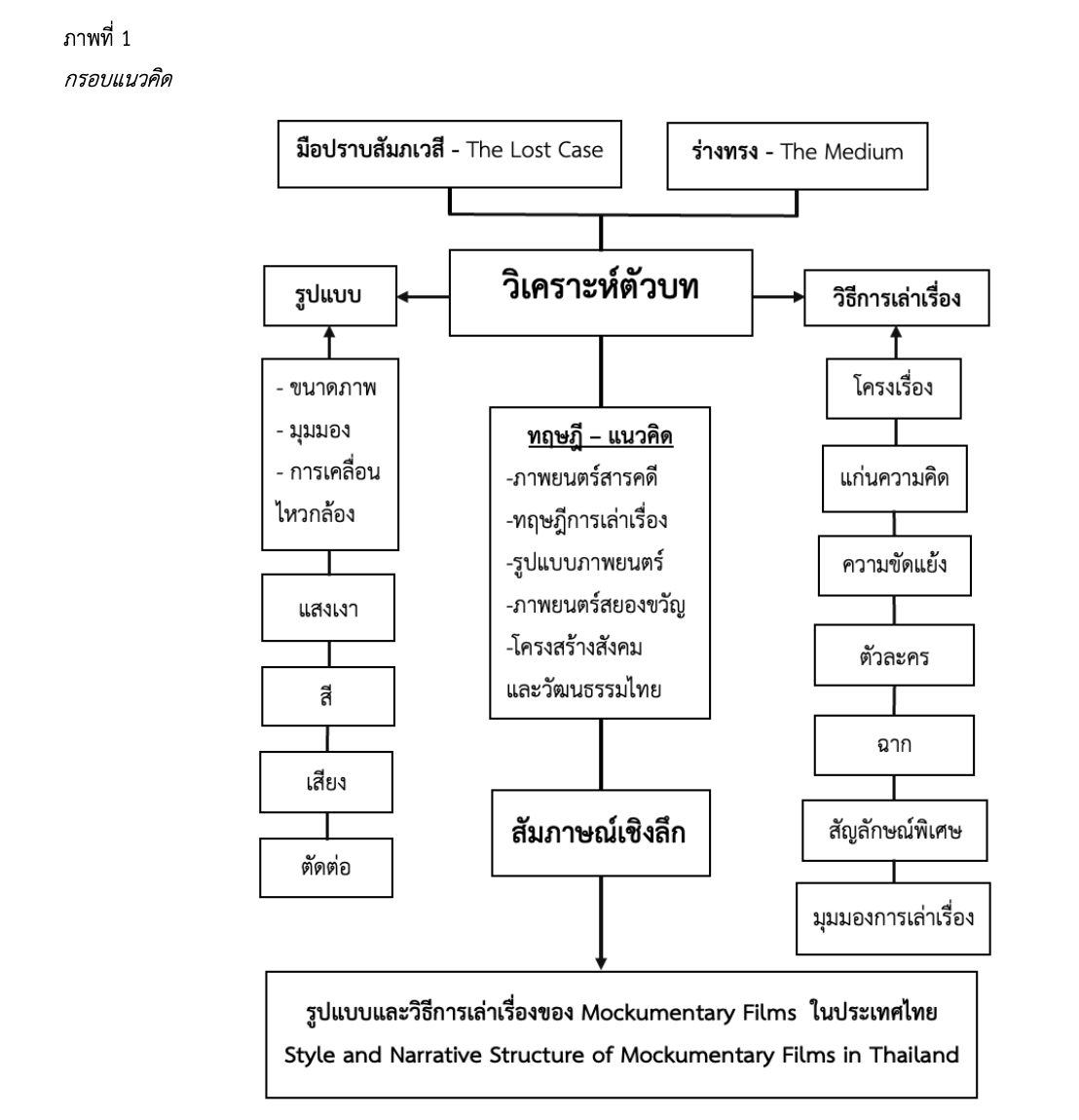รูปแบบและวิธีการเล่าเรื่องของ Mockumentary Films ในประเทศไทย
Main Article Content
บทคัดย่อ
งานวิจัยชิ้นนี้เป็นงานวิจัยเชิงคุณภาพ มีวัตถุประสงค์เพื่อศึกษารูปแบบและลักษณะทั่วไปของ Mockumentary Films และวิเคราะห์วิธีการเล่าเรื่อง และโครงสร้างของ Mockumentary Films ในประเทศไทย ใช้การวิเคราะห์โดยการพรรณนา และวิธีการสัมภาษณ์เชิงลึกรวมทั้งหมด 5 คน โดยทำการศึกษาภาพยนตร์เรื่อง มือปราบสัมภเวสี - The Lost Case (2017) และร่างทรง - The Medium (2021) ผลการวิเคราะห์พบว่า ภาพยนตร์ทั้ง 2 เรื่องมีการใช้รูปแบบหรือเทคนิคการถ่ายทำ คล้ายกับที่ใช้ในภาพยนตร์สารคดีทั่วไป ในส่วนของโครงสร้างการเล่าเรื่อง พบว่า ภาพยนตร์ทั้ง 2 เรื่องมี โครงเรื่อง, แก่นความคิด, ความขัดแย้ง, ตัวละคร, ฉาก, สัญลักษณ์พิเศษ และมุมมองการเล่าเรื่องที่ครบตามองค์ประกอบของภาพยนตร์บันเทิงที่ฉายตามโรงภาพยนตร์ โดยถ่ายทอดเรื่องราวความเชื่อเรื่องผีว่า ผีเป็นภาพแทนของความเป็นอื่น โดยมีความแตกต่างจากมนุษย์อย่างชัดเจน ไม่ว่าจะเป็นในด้านรูปลักษณ์ภายนอกหรืออิทธิฤทธิ์ของผี รวมทั้งความเชื่อที่ว่าผี หรือวิญญาณ เป็นสิ่งที่มีอำนาจเหนือมนุษย์ มีความน่ากลัว ซึ่งผีมารับหน้าที่ในการดูแลจิตใจของผู้ป่วยที่ต้องการที่พึ่งและความอบอุ่นใจ เช่น การทรงเจ้า, การเข้าสิง โดยมีฤทธิ์หรืออำนาจ อยู่เหนือคนทั่วไปสามารถบันดาลให้ดีหรือร้าย ให้คุณหรือโทษได้ ความเชื่ออย่างนี้เรียกว่า ลัทธิผีสางเทวดา (Animism) อันเป็นคติศาสนามาตั้งแต่ดั้งเดิมของมนุษย์ ในขณะเดียวกันก็ยังมีการสร้าง ความหมายใหม่หรือตีความผีใหม่ไปตามกระแสความเชื่อของสังคมแต่ละยุคแต่ละสมัย การนำเสนอผีตามตำนานความเชื่อพื้นบ้านโดยมีการปรับให้เข้ากับสังคม วัฒนธรรม ความเชื่อ และสะท้อนให้เห็นวิกฤติ ความวิตกกังวล ปัญหาของสังคมแต่ละยุคสมัย อาจกล่าวได้ว่าสาเหตุที่เรื่องผีและเหตุการณ์เหนือธรรมชาติยังคงดำรงอยู่เป็นส่วนหนึ่งของภาพยนตร์ Mockumentary ในประเทศไทย ก็คงเป็นเพราะประสบการณ์ของมนุษย์ ในการจัดวางสิ่งเหล่านี้ ในฐานะเป็นปรากฏการณ์ทางสังคมและวัฒนธรรมนั่นเอง
Article Details

อนุญาตภายใต้เงื่อนไข Creative Commons Attribution-NonCommercial-NoDerivatives 4.0 International License.
** ข้อความ ข้อคิดเห็น หรือข้อค้นพบ ในวารสารสหวิทยาการสังคมศาสตร์และการสื่อสารเป็นของผู้เขียน ซึ่งจะต้องรับผิดชอบต่อผลทางกฎหมายใด ๆ ที่อาจเกิดขึ้นจากบทความและงานวิจัยนั้น ๆ โดยมิใช่ความรับผิดชอบของคณะนิเทศศาสตร์ มหาวิทยาลัยราชภัฏรำไพพรรณี **
เอกสารอ้างอิง
ชญานุช วีรสาร. (2560). การผลิตภาพยนตร์สารคดีด้วยการเล่าเรื่องด้วยภาพ. วารสารมหาวิทยาลัยศิลปากร, 37(2), 19-30.
ชนาพร มหาศรี. (2562). การวิเคราะห์ภาษาภาพยนตร์ของภาพยนตร์แนวฟาวด์ ฟุตเทจ (FOUND-FOOTAGE).
[วิทยานิพนธ์ปริญญามหาบัณฑิต ไม่ได้ตีพิมพ์]. มหาวิทยาลัยรังสิต
ธนพล น้อยชูชื่น. (2554). ลักษณะของภาพยนตร์สารคดีที่แสดงอัตวิสัยของไมเคิล มัวร์. [วิทยานิพนธ์ปริญญามหาบัณฑิต
ไม่ได้ตีพิมพ์]. จุฬาลงกรณ์มหาวิทยาลัย.
ปัทมา สุวรรณภักดี. (2555). องค์ประกอบในการเล่าเรื่องของภาพยนตร์สารคดี. มหาวิทยาลัยธรรมศาสตร์.
ปรีดิ์ปณต นัยนะแพทย์. (2018, 20 ธันวาคม). 6 Mockumentaries ชวนดูหนังสารคดีม็อกอัพ. https://thematter.co/entertainment/so-fun-with-6-mockumentaries/52154
พวงเพชร สุรัตนกวีกุล. (2542). มนุษย์กับสังคม (พิมพ์ครั้งที 2). มหาวิทยาลัยเกษตรศาสตร์.
อุบลวรรณ เปรมศรีรัตน์. (2558). การเล่าเรื่องทางนิเทศศาสตร์: ศึกษาจากงานวิจัย. วารสารนิเทศศาสตร์และนวัตกรรมนิด้า,
(1), 31-58.
Bill Nichols. (2001). Introduction to Documentary Film studies : cultural studies. Indiana University Press.
Jennifer, O. (2020, 20 December). BBC’s 1957 April Fool’s “spaghetti-tree hoax” is more relevant than ever. https://arstechnica.com/gaming/2020/04/that-time-the-bbc-fooled-its-audience-into-thinking-spaghetti-grew-on-trees/
Kammeyer, Kenneth C.W. (1997). Sociology: Experiencing Changing Societies. Allyn & Bacon.
Konopásek, Z., & Paleček, J. (2011). The principle of symmetry from the respondents’ perspective: Possessions, apparitions, and mental illnesses. Forum Qualitative Sozialforschung/Forum: Qualitative Social Research, 12(1), Article 12. https://www.qualitative-research.net/index.php/fqs/article/view/12
Laidlaw, J., & Heywood, P. (2013). One more turn and you’re there. Anthropology of This Century. http://aotcpress.com/articles/turn/
Sarakadee Magazine. (2016). Mockumentary. Sarakadee Magazine. https://www.sarakadee.com/2016/09/15/mockumentary/


